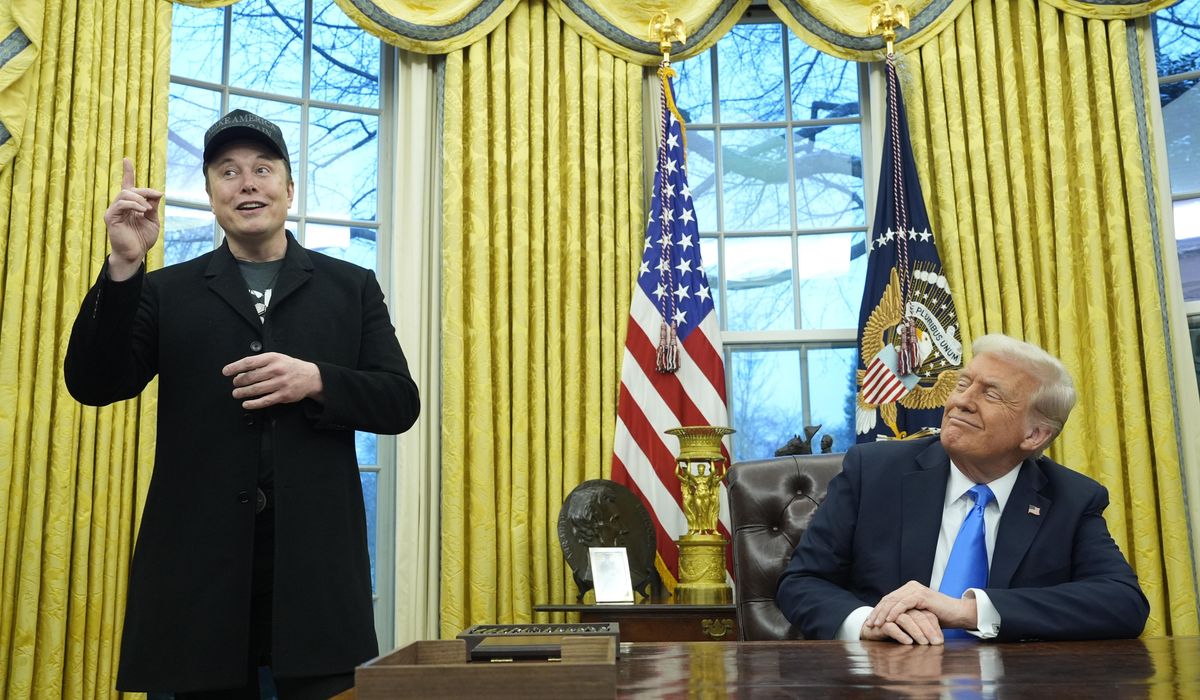


President Trump will double down on his “America First” agenda Tuesday night when he commands the stage for a joint session of Congress and makes the case for smaller government, more tariffs and stricter immigration.
He promised the speech would lay it out for the American people.
“Tomorrow night will be big. I will tell it like it is,” Mr. Trump said Monday on social media.
The president will outline the blueprint that got him elected in November and tie it to the flurry of action he has taken during his first six weeks in office. He is expected to argue that those actions are key to implementing the drastic changes voters sent him to the White House to enact.
Mr. Trump’s initiatives to restructure the federal government will be front and center when he takes the podium in the House chamber. Those initiatives include the Elon Musk-led Department of Government Efficiency, layoffs of tens of thousands of federal workers and plans to shutter multiple agencies. Mr. Trump’s actions have sparked cheers from his base and a flurry of lawsuits from labor unions representing federal workers.
Ryan Walker, executive vice president at Heritage Action, the electoral advocacy arm of the Heritage Foundation, said he expects Mr. Trump to link those cuts to the economy and sell it as part of his overall goal to lower inflation.
“He will tie in the work of his administration and how these policies will unwind the last four years [of President Biden] … which will help with inflation,” he said.
Democratic leaders say Mr. Trump has done little to reduce inflation and should focus more in his speech on domestic priorities rather than his efforts to shrink the government. They worry that the job market can’t handle the flood of out-of-work federal employees.
House Minority Leader Hakeem Jeffries, New York Democrat, said he wants Mr. Trump to explain how he plans to tackle inflation. He dismissed the efforts to shrink the government as “far-right extremism.”
“Why has he failed to do anything to lower the high cost of living in the United States of America, and why has the Trump administration unleashed far-right extremism on the American people in a way that represents an assault on the American way of life?” he recently told reporters.
Democrats plan to underscore the impact of laying off federal workers by bringing some of those workers as their guests to the joint session.
Although the speech is supposed to focus mainly on domestic issues, Mr. Trump said he plans to discuss his efforts to secure a minerals deal with Ukraine. The agreement, which would have given the U.S. a stake in Ukraine’s rare earth elements, has been thrown into doubt after Mr. Trump’s blowup with Ukrainian President Volodymyr Zelenskyy in the Oval Office on Friday.
Mr.Trump said Monday that he doesn’t think the deal is dead and he will touch on it during his address to Congress.
Despite Republican majorities, the Senate and House have made slow progress in delivering legislation on Mr. Trump’s key campaign promises. Only one piece of legislation, the Laken Riley Act, has made it to his desk. It requires federal officials to detain any migrant arrested or charged with crimes ranging from shoplifting to assaulting a police officer.
In his first six weeks, Mr. Trump has made it clear that he doesn’t need Congress to implement the sweeping overhaul of the federal government he promised. He has signed a record number of executive orders, shuttered departments, fired tens of thousands of federal workers, created an advisory agency to slash spending, and challenged Congress’ control of the purse strings by refusing to spend money allocated by law.
Congress has a March 14 deadline to fund the government and avert a partial shutdown. Mr. Trump has called for a stopgap funding measure to keep the government open, which could be his biggest legislative request Tuesday night.
“In these types of speeches, the president tries to broaden his base of support. Rather than doing that, I think Mr. Trump is going to enforce loyalty among Congress, which he needs to pass a budget and raise the debt ceiling,” said Robert Rowland, who teaches presidential rhetoric at the University of Kansas.
Mr. Trump also is expected to further outline his plans to reduce illegal immigration. Since taking office, he has suspended the asylum process at the southern border and refugee resettlements. He moved to end birthright citizenship for children born to illegal immigrants, though several federal judges blocked that.
Border crossing numbers are at some of their lowest levels in years.
He will also talk about tariffs. Mr. Trump has imposed a 10% tariff on Chinese goods and is expected to impose another 10% on China and 25% on Mexico and Canada on Tuesday.
• Jeff Mordock can be reached at jmordock@washingtontimes.com.
